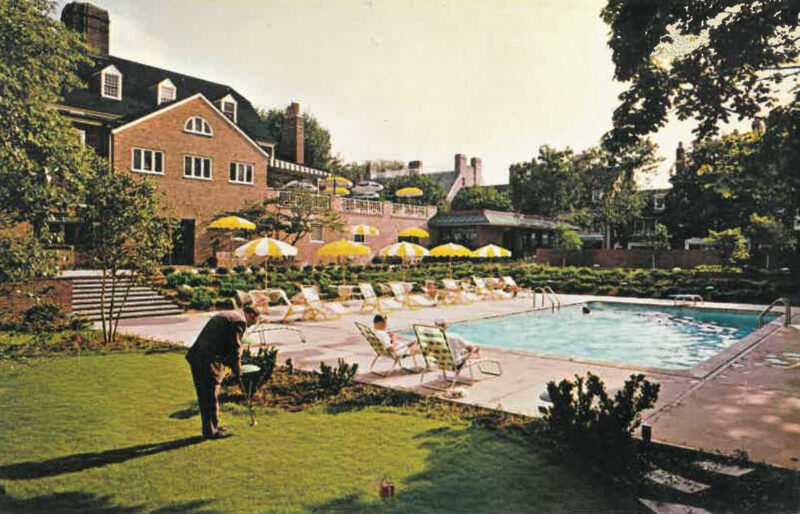Nassau Inn One of More Than 300 Hotels Inducted Into Historic Hotels of America
WHO KNEW?: A pool behind the Nassau Inn? This photo, which provides proof, is part of the hotel’s collection of memorabilia that helped qualify it as a member of the National Trust for Historic Preservation’s Historic Hotels of America program.
By Anne Levin
The Nassau Inn has become part of Historic Hotels of America, a program of the National Trust for Historic Preservation that recognizes hotels “that have faithfully maintained their historic integrity, architecture, and ambiance,” according to the National Trust.
With the designation, the Nassau Inn joins such establishments as the Algonquin Hotel in Manhattan, the Fairmont Copley Plaza in Boston, and the Hotel Du Pont in Wilmington, Del.
“We are very excited,” said Lori Rabon, vice president Nassau Inn and Palmer Square. “To be able to showcase our historical significance is a different way to market the hotel. And it’s very appropriate now that we’re coming up on the 250th anniversary [of the signing of the Declaration of Independence].”
While the Palmer Square hostelry was built in 1937, its roots stretch back to 1756. Originally on Nassau Street across from the campus that would become Princeton University, it was the home of Judge Thomas Leonard, a future signer of the Declaration of Independence. After Leonard’s death, the house was sold to Christopher Beekman, who turned it into the College Inn, later known as “Old Nass.”
“Wine and debate flowed freely in Christopher Beekman’s taproom where his wife helped tend the punchbowls,” reads the press release announcing the designation. “During these uncertain times, students and townsmen gathered over food and drink [to hear] of the news and opinions of honored guests such as Paul Revere, Robert Morris, and Thomas Paine, who stayed the night more than once at the public house.”
Patriots often visited the inn. Delegates on their way to the first meeting of the Continental Congress in Philadelphia, and signers of the Declaration of Independence, are said to have rested there. “As the war began, military men took the place of travelers,” reads the release. “Officers of the Continental Army, also the British and Hessians (depending upon which side was in possession of the town), whiled away their time in the taproom.”
The recent designation from the National Trust is not the first for the Nassau Inn.
“We had been a part of [the program] in the early 2000s, for a brief period,” said Rabon. “At that time, we were expanding in other ways, and we let our membership with them lapse on purpose. Once we finished renovating, and really thought we were adhering to the historical values with the spaces inside the hotel and the whole complex of Palmer Square, we went back to them and applied for the designation again. They evaluated us, and we are back on the list.”
To be selected for Historic Hotels of Amerca, a hotel must be at least 50 years old. It must have been designated by the U.S. secretary of the interior as a National Historic Landmark; or listed in — or eligible for — listing in the National Register of Historic Places. It must also be recognized as having historic significance.
“We commend Nassau Inn, Palmer Square, and [the] leadership team for their careful historic preservation work, stewardship, and vision that will allow future generations of travelers to experience this unique historic designation,” said Lawrence Horwitz, executive vice president of Historic Hotels of America and Historic Hotels Worldwide.
The hotel’s renewed focus on history has unveiled some interesting curiosities. “We have some pieces from the original 1756 building up on Nassau Street from when they razed it,” said Rabon. “What we’ve also done is spend a tremendous amount of time going through and pulling our different collections of historic photos and placing them around the hotel. That lets people visually experience the growth of the inn — what we were, and what we are now.”
Different wings of the building were designed to help tell its story. “The wing representing the earlier period is built in the style of Princeton’s founders, with the low-raftered ceiling of oak and timber, large stone fireplace in the center, and quaint little staircase,” reads the release. “A small stone addition and a substantial multi-story brick wing were added over the years.”
A stone platform seat that was used in the cellar of “Old Nass” to support casks of wine and spirits is just inside the red door of the inn. On the north wall of the lobby, near the entrance to the dining room (Palmer Room) are two weapons — a Hessian sword and a gun that were used in the Battle of Princeton.
The hotel built additional guest rooms in the 1960s. What is now the skating rink behind the hotel was once an expansive swimming pool.
“At one time, we had a beautiful pool out back,” said Rabon. We ran food service out there from the [Yankee Doodle] Tap Room. It’s all filled in now, but it’s still there, underneath.”
The recent opening of the Graduate hotel, officially known as Graduate by Hilton Princeton, marks the first time a hotel has arrived in downtown Princeton since the Nassau Inn began hosting visitors nearly nine decades ago. Rabon looks upon this new neighbor as a plus rather than unwelcome competition.
“We were excited to hear of the Graduate. The opportunities for having another established property right in the heart of downtown leads us to be able to partner with them,” she said. “They don’t have event space and they are limited in what they can do for meetings, whereas we can offer those services. So we’re looking forward to working with them. It pulls off the Route 1 corridor and puts more focus on the downtown, which we all want.”


